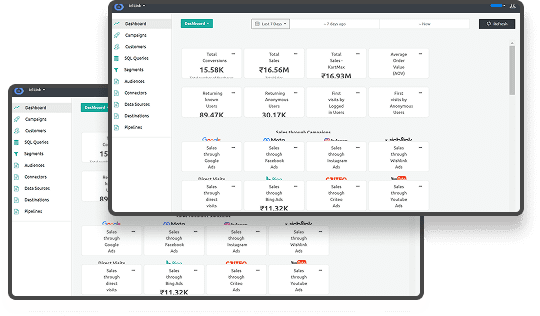Ever wondered how top brands seamlessly track user behavior without slowing down their websites? The secret lies in the effective use of tag managers. These tools simplify the handling of tracking codes, enhancing your website's performance while collecting valuable insights.
Understanding tag management is crucial for optimizing your digital marketing strategies, especially as we move toward a cookieless future. With the right tag managers, you can ensure compliance with regulations like GDPR and CCPA, improve user experience, and build trust with your audience.
In this blog post, we'll explore what tag management is and discuss top solutions you should consider.
First, let's delve into the basics of tag to understand its importance.
What is a tag?
A tag is a small piece of JavaScript code added to your website to collect information and send it to third-party services for analytics and digital marketing purposes. These tags are essential for tracking user behavior, measuring campaign effectiveness, and gathering data to inform your marketing strategies. For more on the importance of tags, you might find Understanding the Importance of Meta Tags and Tags for SEO on your Website helpful.
Tags play a crucial role in collecting data about how users interact with your website and other digital channels. They track page views, clicks, form submissions, and other user actions. This information helps you understand your audience better and tailor your marketing efforts to meet their needs. By collecting user behavior data across multiple channels, tags enable you to create a more comprehensive view of your customers.
Now that we've defined what tags are and their role in collecting user behavior, let's explore how Tag Management Systems can simplify managing these tags.
What is Tag Management Systems (TMS) ?
Tag Management Systems (TMS) are centralized tools that let you manage all your website tags without needing help from IT or developers. With a TMS, you place a single container tag on your website, which holds all your other tracking tags. You set rules for when and how each tag should fire, giving you complete control over your tracking without touching any code. For more on how tag managers can boost your marketing efforts, check out Understanding the Importance of Meta Tags and Tags for SEO on your Website.
Moreover, TMS platforms use a data layer to gather and store user behavior data. This data layer acts like a holding area where information about what users do on your site is collected. Your tags then use this data to send valuable insights to your analytics and marketing tools. You can respond faster to trends, optimize campaigns on the fly, and make informed decisions based on real-time data. If you're interested in tracking the customer journey across multiple channels, you might find Track the Customer Journey Across Multiple Channels with Ingest Labs helpful.
Understanding how TMS functions highlights the numerous advantages they bring to your business.
How Tag Management Systems Work
Understanding how Tag Management Systems (TMS) operate is simple when we focus on four key points:
1. Single Container Tag on Your Website
- To get started, you can add a main container tag from the TMS to your website's code. This container holds all your individual tracking tags, simplifying your site's code and improving performance. This makes managing tags much easier and keeps your website running smoothly.
2. Manage Tags Without Coding
- Through the TMS dashboard, you can add, edit, or remove tags without any coding skills. This user-friendly interface allows anyone on your team to handle tags efficiently. By using tag managers, you save time and reduce the risk of errors that can happen when editing code manually.
3. Use a Data Layer for Information
- The TMS utilizes a data layer to collect and store information about user behavior on your site. This structured data helps your tags provide accurate insights to your analytics and marketing tools. Understanding how users interact with your site is crucial for optimizing your marketing strategies. For more on tracking user behavior, you might find Best Tools for Tracking Digital Properties helpful.
By understanding these, you can see how tag management systems streamline your website's tracking capabilities, enhance performance, and give you valuable insights into your audience.
Let’s look at some benefits of using tag managers.
Benefits of Using Tag Managers
- Streamlined Data Collection:
- Managing multiple tracking codes can be a headache. With a tag manager, you can handle all your tags from a single dashboard.
- This not only saves time but also minimizes the risk of errors that can occur when manually editing your site's code.
- Plus, if you want to add new marketing tools or analytics services, you can do so quickly and easily.
- Ingest IQ simplifies data collection by allowing you to manage all your tags from a single dashboard. This centralized approach saves time and reduces errors associated with manual code edits.
- Improved Website Performance:
- Have you ever visited a website that takes forever to load? Slow websites can frustrate visitors and lead them to leave before even seeing your content.
- Mismanaged tags can slow down your site because each tag adds extra code that the browser needs to load.
- Using a tag manager, you optimize how these tags load, speeding up your website.
- Ingest Labs' Tag Management Solution streamlines tag implementation across your digital properties, enhancing website performance and user experience. By simplifying tag management and diagnosing anomalies, it reduces page load times and improves data privacy compliance.
- Enhanced Compliance with Data Privacy Regulations:
- Data privacy laws like GDPR and CCPA require you to handle user data responsibly. Tag managers help you manage consent and ensure that you're only collecting data from users who have agreed to it.
- This not only keeps you compliant with the law but also builds trust with your visitors.
- Better Marketing Insights:
- With accurate and organized data, you gain deeper insights into your audience's behavior.
- You can see which marketing campaigns are working, which pages are most popular, and where visitors might be dropping off.
- This information allows you to adjust your strategies for better results.
- Consider using Event IQ offers a comprehensive solution for enhancing marketing insights. With real-time campaign performance insights, you can identify which marketing efforts are effective, understand user behavior, and pinpoint areas where visitors may disengage.
While tag managers offer many benefits, it's important to be aware of the challenges you might face.
Common Challenges in Tag Management
Some of the common challenges of using tag management are:
- Handling Multiple Tags:
- As your business grows, you'll likely use more tools that require tracking codes. Managing all these tags can become complex. Without a centralized system, you might lose track of which tags are active, leading to duplicate data or conflicts between tags.
- To keep your tags organized and error-free, consider proactive monitoring strategies outlined in How to Stay Ahead of Tag Errors with Proactive Monitoring.
- Impact on Website Speed if Mismanaged:
- Incorrectly implemented tags can significantly slow down your website. This not only frustrates users but can also negatively impact your search engine rankings.
- Search engines like Google consider page speed when ranking sites. Learn more about optimizing your site's performance in Understanding and Improving Core Web Vitals.
- Data Privacy Concerns:
- Using third-party tags without proper management can expose you to data privacy risks.
- Unauthorized tags might collect sensitive user information without consent, leading to legal issues.
- Tag Piggybacking is one of the major sources of data leakage.
- With the increasing restrictions on third-party cookies, as discussed in Third-Party Cookie Restrictions: Challenges and Solutions, it's crucial to manage your tags carefully.
Ingest Labs centralizes tag management to prevent conflicts and errors, optimizes website performance with efficient tag loading, and ensures data privacy compliance by integrating with consent systems. This streamlined approach maintains site speed, protects user data, and provides reliable analytics, enabling businesses to focus on growth with confidence.
To overcome these challenges, choosing the right tag management solution is crucial.
Top Tag Management Solutions to Consider
When it comes to choosing a tag management solution, there are several options available, each with its own strengths. Here's a look at some popular tag managers you might consider:
1. Ingest IQ
Ingest IQ is a robust solution designed to streamline data collection in a cookieless world, specializing in website and mobile app tagging. It offers tools like tag monitoring, live debugging, and crowd testing, enabling seamless data gathering without relying on third-party cookies. The platform supports real-time data streaming for deeper insights, ensuring accurate, privacy-complaint tracking.
2. Adobe Experience Platform Launch
Adobe Experience Platform Launch offers robust APIs and seamless integration with other Adobe products. If you're already using Adobe's marketing tools, this could be a great fit. It provides advanced features for customized tag deployment and comprehensive data management.
3. Google Tag Manager
Google Tag Manager is a free and user-friendly tool that's widely used. It simplifies adding and updating website tags without needing to edit your site's code, making it accessible for non-technical users.
4. Tealium
Tealium is known for its strong eCommerce integrations and robust privacy features. It supports a wide range of marketing tools and offers advanced data governance capabilities, which is great for businesses that prioritize data privacy and compliance.
5. Signal Tag Management
Signal focuses on enterprise-level solutions with built-in privacy policies. It offers real-time data collection and activation, helping large organizations manage complex tagging needs while adhering to strict data regulations.
Selecting the right tag management solution depends on your specific needs, such as the tools you're already using, your technical expertise, and your data privacy requirements. For a more detailed comparison, check out Top Google Tag Manager Alternatives in 2024.
With these options in mind, understanding how to choose the best tag manager for your needs becomes essential
Criteria for Selecting a Great Tag Manager
When choosing a tag manager, consider the following:
Choosing the right tag manager is essential for optimizing your website's performance and enhancing your digital marketing efforts. Here are key criteria to consider when selecting a tag manager:
1. Ease of Use
- User-Friendly Interface: The tag manager should have an intuitive dashboard that allows non-technical users to add, edit, and manage tags effortlessly.
- Quick Deployment: Look for solutions that enable rapid implementation without extensive setup time.
2. Integration Capabilities
- Compatibility with Marketing Tools: Ensure the tag manager supports integration with your existing marketing and analytics platforms like Google Analytics, Meta CAPI, or TikTok Events API.
- Pre-Built Integrations: A wide range of pre-built integrations can save time and simplify the setup process.
3. Data Privacy and Compliance
- Regulatory Compliance: The tag manager should help you comply with data protection laws like GDPR and CCPA.
- Consent Management Features: Look for built-in tools that manage user consent and data privacy preferences. Ingest Labs caters to this by providing integrated consent management tools that efficiently handle user permissions and ensure compliance with data privacy regulations.
4. Performance Impact
- Website Speed Optimization: The solution should enhance your site's performance, not hinder it. Efficient tag managers reduce page load times.
- Server-Side Tagging: Consider tag managers that offer server-side tagging to improve speed and data security.
5. Scalability
- Handles Growing Data Needs: Choose a tag manager that can scale with your business as your website traffic and tagging requirements increase.
- Supports Multiple Websites or Apps: If you manage several digital properties, ensure the tag manager can handle them all efficiently.
Selecting the right tag manager involves assessing your current needs and anticipating future requirements. Among the available options, one solution stands out by meeting all these criteria effectively.
Why Ingest Labs is the Optimal Choice
- Server-Side Tagging Expertise:
- Traditional tag managers operate on the client side, meaning the user's browser handles the tags. Ingest Labs takes a different approach with server-side tagging.
- This means tags are processed on your server, reducing the load on the user's browser. The result is faster page load times and a smoother user experience.
- Data Privacy and Compliance:
- Ingest Labs is built with data privacy in mind. It helps you manage user consent and ensures that data collection complies with regulations like GDPR and CCPA. By centralizing control over your tags, you reduce the risk of unauthorized data collection.
- Extensive Integration Capabilities:
- With over 100 pre-built integrations, Ingest Labs makes it easy to connect with various marketing and analytics platforms. Whether you're using Meta CAPI, TikTok Events API, or Google Measurement API, Ingest Labs has you covered.
- Performance Optimization:
- By handling tags on the server side, Ingest Labs minimizes the impact on your website's performance. Faster websites not only keep users happy but can also improve your search engine rankings.
Implementing Ingest Labs can transform how you manage your tags and data collection.
Conclusion
Effective tag management is a cornerstone of successful digital marketing. It enhances your website's performance, ensures compliance with data privacy laws, and provides valuable insights into your audience's behavior. By using a robust tag manager like Ingest Labs, you can tackle the challenges of tag management head-on.
Ingest Labs stands out with its server-side tagging, extensive integrations, and focus on data privacy. It's designed to help businesses like yours thrive in an evolving digital landscape, especially as we approach a cookieless future.
Are you ready to optimize your website and marketing strategies with advanced tag management? Contact Ingest Labs to learn more and get started today.






